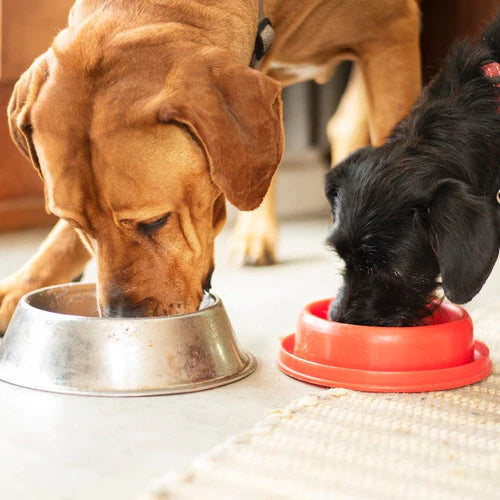Bacteria Alert: Why You Need to Keep Your Dirty Dog Bowls Clean

Have you ever looked at your dog's eating area and asked yourself... is that a pet food dish or a petri dish? Unfortunately, we've got bad news for our fellow pet parents: unless you clean your dog food and water bowls after each feeding, you've got both. Ready to be grossed out? Read on! Then grab your rubber gloves because we've got tips for keeping your dirty dog bowls clean and your household safe from pooch cooties.
What's Lurking in Your Dirty Dog Bowls?
Did you know that, according to an NSF study, dog dishes are the fourth "germiest" things in our home? It's true. That slimy coating that grosses you out each time you pick up your pet's dirty water or food bowl is called "biofilm," and it's made up of hazardous microorganisms that threaten your pet's health — and yours. It doesn't matter if you feed wet food, kibble, or the occasional treat; dirty dog bowls contain harmful bacteria such as:
- E.coli
- Salmonella*
- Listeria*
- MRSA
Most healthy animals and people can tolerate small amounts of harmful bacteria. But the quantities found in dirty dog bowls can pose a severe risk to animals and people with compromised immune systems.
Dog water dishes are just as unsanitary as food bowls. When your dog drinks, they transfer germs from their mouths (and possible contamination from their food), and dog water at room temperature is an excellent habitat for bacteria. Could you be sure to give your pet fresh water at every feeding?
*Especially if you feed a raw diet, as per the Centers for Disease Control and Prevention (CDC)
Not Washing Enough? You're Not Alone!
According to veterinary nutritionist Dr. Emily Luisana, DVM's new study on pet food handling and sanitary practices, you're in the majority if you've let your dishwashing duties slide. In her report, she found out of 417 surveyed dog owners, less than five percent were aware of Food and Drug Administration (FDA) guidelines about safe storage and feeding practices. Also, only a third of respondents claimed to wash their hands after feeding their pets. Here are some more fun facts from Dr. Luisana's findings:
- Only 2/3 of those surveyed reported using a different surface for preparing dog food.
- 22% of participating pet owners washed pet dishes once a week.
- 18% washed them at most once every three months.
- Once participants began implementing FDA guidelines, contamination detection dramatically dropped.
We'll get to the FDA's food handling and storage guidelines, but first... let's attack those disgusting dog dishes, shall we?
How to Clean Your Dog Bowls
The FDA recommends that dog owners wash food dishes between each feeding and the water dish every day or so. However, we go a step further and suggest you go ahead and wash your dog's water dishes and food dishes after each mealtime to keep things simple.
- Hand wash them with hot, soapy water, then soak them in a solution of 1/3 cup bleach to one gallon of water for 10 minutes. Then, rinse them thoroughly and allow them to air dry.
- If you plan to use your dishwasher, always use the sanitary selection, or run them separately from non-pet dishes.
To avoid cross-contamination, never use the same cleaning scrubs and sponges on your dog bowls that you use for other dishes or household cleaning. Instead, you can keep your dog bowl cleaning tools in a separate container, preferably in a different room from your kitchen. Then, when you clean your dog dishes daily, you'll likely only need to use a paper towel or two. But a stainless steel scrubber is easy to disinfect and dry. It's also cheap to replace if it gets... gooey.
We'll Help You Keep Your Pets Safe (And Spoiled)
The following tips are FDA guidelines and recommendations from the CDC. Both strongly advise against feeding store-bought or home-prepared raw diets due to their high risk of contamination to dogs, pet owners, and their families.
- Always wash your hands with warm soapy water after handling pet food. Also, if your pets are messy eaters, you might consider washing them too with an organic dog shampoo or dog bar soap.
- Don't let small children near your dog's food bowl. (We can think of a few more reasons.)
- Avoid playing with your pets immediately after they've eaten.
- Thoroughly clean dog food storage containers before you refill them. Don't forget the scoops!
- Only use storage containers with tight-fitting lids.
- If possible, keep the original bag (or the UPC barcode label and expiration date) with the product until the food is gone in case of a recall or if you suspect it made your dog ill.
- Consider placing raw food packages in additional containers for a second layer of protection.
- Thaw raw dog food in the refrigerator (not on the kitchen counter), preferably on the lowest shelf; this prevents juices from dripping on human food items.
- Dry food should be stored below 80°F; wet food should be refrigerated at 40°F or below.
- Only use stainless steel pet food bowls and water dishes. Never use plastic bowls, which harbor the most germs (surprisingly, ceramic bowls are home to the worst).
Cleaning dirty dog bowls might be different from your idea of living the dream. But from your pet's point of view—from their luxurious Animals Matter dog bed, of course—you're there to serve their needs. And Animals Matter is here to help you look after your pets' health with our line of luxury orthopedic dog beds, mobility-friendly dog stairs, and dog car seats.
Conclusion
It’s essential to be aware of the potential risks that come with feeding your dog from dirty bowls. Bacteria such as E.coli, Salmonella, Listeria, and MRSA can all be present in unkempt dog dishes and cause serious health problems for your pet. The best way to prevent these harmful bacteria is to use ceramic or glass bowls instead of plastic. While these materials may be more expensive upfront, they will save you money in the long run by keeping your dog healthy and avoiding trips to the vet. So what type of bowls do you use for your dog? Let us know in the comments below!
Quick FAQs
What happens if you don't clean your dog's water bowl?
If you don't wash your pet's bowls after each feeding, accumulated residue harbors harmful bacteria that can make your pet and your family sick. Water bowls can carry the same bacteria as food bowls.
How do you keep bacteria out of a dog's water bowl?
Keep up with your dog's oral health, and clean all dog bowls after each feeding. Avoid leaving water and food bowls where wildlife can contaminate them. Properly store all dog food in sealed containers at the correct temperatures.
What is the best way to clean a dog's water bowl?
Wash and scrub all dog bowls with hot water and soap, followed by a soak in a water/bleach solution before air drying. Alternatively, use the sanitary cycle on your dishwasher.
Subscribe
Sign up to get the latest on sales, new releases and more…
Categories
- How to Get a Fearful Dog to Trust You: A Compassionate Guide for Rescue Dogs
- What Is Dog Boarding? A Complete Guide to High-End Stays for Your Dog
- Dog UTI Symptoms: How to Spot, Treat, and Prevent Urinary Tract Infections
- Psyllium Husk for Dogs: Science-Based Benefits, Dosage and Use
- Dog Meal Prepping : A Complete Guide to Healthy, Time-Saving Homemade Meals
- Best Places to Take Your Dog on Vacation this 2026(USA Edition)
- Tails of Celebration: Working Dogs of the Lares Trek, A Silent Partnership In Peru
- 5 Easy Organic Christmas Recipes for Dogs: Simple Holiday Treats Your Companion Will Love
- The 6 Best Luxury Gifts for Your Dog This Christmas: Thoughtful Holiday Comfort That Truly Lasts
- Why Playtime Matters: The Benefits of Mental Stimulation and Playtime with Your Companion
- Tails of Celebration: The Miao Dog-Carrying Festival - A Hero's Honor in China
- A Dog-Friendly Thanksgiving 2025: Comfort, Calm, and Easy Treat Recipes
- The Best Dog Beds for Winter 2025: 5 Luxury Styles for Warmth, Comfort & Orthopedic Support
- Tails of Celebration: The Feast of Saint Hubert — Belgium's Timeless Blessing
- Halloween Safety Tips for Dogs: How to Keep Your Companion Safe This Spooky season
- Tails of Celebration: Día de los Muertos / Day of the Dead for Pets, A Festival of Memory in Mexico
- How to Care for Senior Dogs in Fall: Mobility Tips & Joint Support
- Tails of Celebration: Kukur Tihar & The Tihar Festival of Nepal
- What is a VDI Testing for dogs ? : Insights, Procedures and Preventive Measures
- Cheap Dog Beds vs. Luxury Dog Beds: The Real Cost of a $50 "Disposable" Dog Bed
- Can Dogs Have OCD? Understanding Canine Compulsive Behaviors (CCD)
- Does My Dog Like Music? Find Out What Tunes Make Your Pup Wag!
- Effective Solutions for Food Aggression in Dogs
- 7 Frozen Treats Your Dog Will Love This Summer☀️🧊🍉
- The Best Waterproof Liners for Dog Beds: Protect Against Spills, Drool, and Accidents
- How to Cope with the Loss of a Dog: A Tribute to Every Companion We Carry in Our Hearts
- Top Tips on How to Prevent Matting in Dogs
- Understanding and Managing Dogs with Hip Dysplasia
- The Ultimate Guide to Dog Gut Health: Natural Remedies, Probiotic Insights and Signs of Poor Gut Health
- The Best Supplements for Dogs: Explore Top Picks for Canine Health and Wellness
- How Often Should I Brush My Dog's Teeth? Tips for Optimal Canine Dental Health
- Ultimate Guide on How to Comfort Your Dog During Fireworks this 4th of July
- Managing a Blowing Coat: Essential Grooming Tips for Double-Coated Dogs.
- 5 Daily Habits That Boost Your Dog’s Long-Term Wellness
- Mastering Crate Training a Dog: Tips and Benefits
- Dog Car Seats vs. Seat Covers: What’s The Best Option For Your Companion?
- Best Outdoor Dog Beds: Luxury, Durability, and Unmatched Comfort
- Is My Dog Overweight? Tips to Assess and Help Your Companion
- The Best Faux Fur Dog Beds for Ultimate Pet Comfort of 2025
- Dog Running Guide: How to Start, Train & Stay Safe when running with your Dog
- Indestructible Dog Beds? The Truth Behind the Term
- Top Tips for Effective Exercise for Dogs
- Effective Dog Ear Cleaning: A Step-by-Step Guide for Maintaining Healthy Ears
- How to Manage Dog Aggressive Behaviors: Expert Tips and Advice
- Effective Canine Ear Infection Remedies: Symptoms, Causes & Treatments
- How to Make a New Dog Comfortable in Their New Home - 2025 Guide
- Signs of Dog Allergy Symptoms and How to Help and Prevent Them
- Why Does My Dog Lick Their Paws? Causes and Solutions Explained
- Dog Alzheimer's: Symptoms, Causes, and Treatment Options
- The Legacy of Comfort with the Iconic Animals Matter® Ortho Companion-Pedic® Puff Luxury Dog Bed


Leave a comment
Please note, comments must be approved before they are published